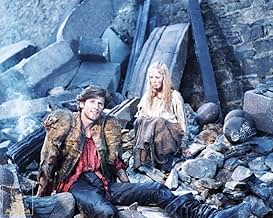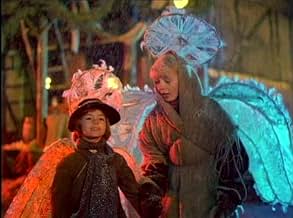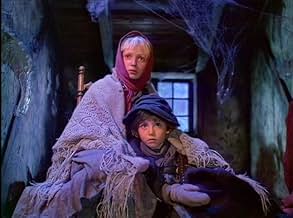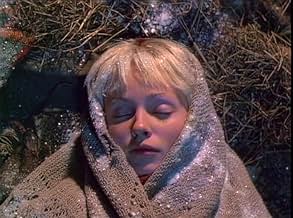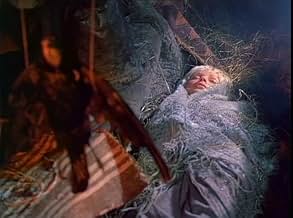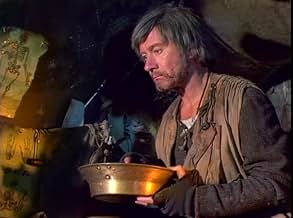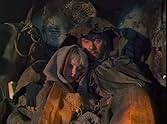Skazka stranstviy
- 1983
- 1h 41min
CALIFICACIÓN DE IMDb
7.7/10
1.2 k
TU CALIFICACIÓN
Agrega una trama en tu idiomaIn a medieval fantasy kingdom, two orphans, May and his sister Martha, live in poverty. A group of robbers kidnap May to use his magic talent: he feels sick when surrounded by gold, therefor... Leer todoIn a medieval fantasy kingdom, two orphans, May and his sister Martha, live in poverty. A group of robbers kidnap May to use his magic talent: he feels sick when surrounded by gold, therefore he can feel gold from a long distance.In a medieval fantasy kingdom, two orphans, May and his sister Martha, live in poverty. A group of robbers kidnap May to use his magic talent: he feels sick when surrounded by gold, therefore he can feel gold from a long distance.
- Dirección
- Guionistas
- Elenco
Kseniya Piryatinskaya
- May
- (as Ksyusha Piryatinskaya)
Baltybay Seytmatov
- Second robber
- (as B.Seitmamutov)
Valeriy Storozhik
- May (after 10 yrs.)
- (as V.Storozhik)
Carmen Galin
- Plague
- (as K.Galin)
Venyamin Smekhov
- Don Quixote
- (as V.Smekhov)
Aleksandr Pyatkov
- Driller
- (as A.Pyatkov)
Octavian Cotescu
- Judge
- (as O.Kotesku)
Jean Lorin Florescu
- Prosecutor
- (as Zh.L.Floresku)
Vladimir Basov
- Barrister
- (as V.Basov)
- Dirección
- Guionistas
- Todo el elenco y el equipo
- Producción, taquilla y más en IMDbPro
Opiniones destacadas
10avichi
I have not much more to add to the reviews - this movie gets a 10 from me. This flight episode, together with Tarkovsky's flight episodes from "Andrei Rublev" (opening) and "Solaris" (closing) is IMHO the most moving and inspiring moment in film history.
A small remark for the former Soviet citizens among you;-)
Has anyone also felt some well-concealed allusions to the life behind the Iron Certain as much as I did in the episode with Don Quixote and the knights on top of the dragon?
Just like in a "communist" system, for many it was actually quite warm and sweet while for some it was not quite as easy to get out as it was to get in (most likely the same could be said about a "capitalist" system too though). I think such allegories were quite common in Soviet movies and it is often a sport to find and interpret them.
A small remark for the former Soviet citizens among you;-)
Has anyone also felt some well-concealed allusions to the life behind the Iron Certain as much as I did in the episode with Don Quixote and the knights on top of the dragon?
Just like in a "communist" system, for many it was actually quite warm and sweet while for some it was not quite as easy to get out as it was to get in (most likely the same could be said about a "capitalist" system too though). I think such allegories were quite common in Soviet movies and it is often a sport to find and interpret them.
The film follows two orphans, a sister and her younger brother, separated when the youngest is stolen for his magical ability to feel gold, something which at the same time tortures the young boy. The sister runs, looks, even sees him at a distance, but her struggles only continues. Luckily she gets aide from a philosopher and healer, who in many ways serves as the film's main comic relief, but his journey is not a happy one either.
From the very beginning, as the camera closed in on the town, as the music played, as the colors exploded, I knew I would love this film. Almost every frame was perfect, and they drew up the magical world we are visiting in the most perfect way imaginable. This is a beautifully dark and twisted fairytale, in the way only Eastern Europeans can make them. It created it's own world with an amazing eye for details, and managed to be absurd and funny, at the same time as it told a very, very bleak story. It could be described as an odyssey, a tragic chase, a voyage into strange lands, and visions we will see.
And beyond it all, there is color. Nearly every image seems perfectly crafted. The full glory of soviet cinematography. It was so masterly directed and shot I bookmarked all films directed by Aleksandr Mitta, and even looked into other films by the cinematographer, Valeri Shuvalov. Two names I had never heard of before. This was a truly amazing discovery, and I can't wait to search out more.
From the very beginning, as the camera closed in on the town, as the music played, as the colors exploded, I knew I would love this film. Almost every frame was perfect, and they drew up the magical world we are visiting in the most perfect way imaginable. This is a beautifully dark and twisted fairytale, in the way only Eastern Europeans can make them. It created it's own world with an amazing eye for details, and managed to be absurd and funny, at the same time as it told a very, very bleak story. It could be described as an odyssey, a tragic chase, a voyage into strange lands, and visions we will see.
And beyond it all, there is color. Nearly every image seems perfectly crafted. The full glory of soviet cinematography. It was so masterly directed and shot I bookmarked all films directed by Aleksandr Mitta, and even looked into other films by the cinematographer, Valeri Shuvalov. Two names I had never heard of before. This was a truly amazing discovery, and I can't wait to search out more.
This movie is supposed to be a fairytale. Is not. I saw it some years ago and I tell you: it's really dark, dark fantasy. The plague, personalized as a female beggar or beautiful lady brought me several nightmares. Well, this movie is really good! But don't allow your children watch it!
10snoducky
Still holds up to this day.
This movie creates a magical atmosphere incredibly well using music, landscapes and acting to create something unique for that time. The film shows how experiences shape people to the better or worse, in this case it is Schoenberg through the change from innocence and poverty to arrogance and wealth. Although it's a very simple plot it hides many hidden symbolic elements which when revealed really makes you realise how superb this film is. The music in this movie along with the camera shots really are touching and do feel surreal, magical and pure. Back then it was hard to make a truly scary scene but this movie manages to capture some very eerie moments which even made me feel uneasy, in the kidnapping scene everything seemed a bit off, the kids were dreaming of a happy jolly santa but they were greeted with a dirty, deceitful and ambitious santa, thirsty for wealth and the illusion of happiness . The plague scene was miserable, it engulfs you in darkness and and people seem to lose their fire and become soulless striders exhausted by the plague chipping at society and hope day by day. Finally there's the dragon scene, it represents how civilisation will always want more, humans are greedy by nature; the judge scene conveys the social imbalances of humanity and injustice of law and corruption in pretty much all countries. For a film that's 40 years old it's just a blast to watch, although the creatures look a bit goofy they still strike fear and terror into you. What fascinates me is that sometimes people can make better quality movies with less resources, for example this film is much better than a lot of present day films. Overall a surreal film.
This movie creates a magical atmosphere incredibly well using music, landscapes and acting to create something unique for that time. The film shows how experiences shape people to the better or worse, in this case it is Schoenberg through the change from innocence and poverty to arrogance and wealth. Although it's a very simple plot it hides many hidden symbolic elements which when revealed really makes you realise how superb this film is. The music in this movie along with the camera shots really are touching and do feel surreal, magical and pure. Back then it was hard to make a truly scary scene but this movie manages to capture some very eerie moments which even made me feel uneasy, in the kidnapping scene everything seemed a bit off, the kids were dreaming of a happy jolly santa but they were greeted with a dirty, deceitful and ambitious santa, thirsty for wealth and the illusion of happiness . The plague scene was miserable, it engulfs you in darkness and and people seem to lose their fire and become soulless striders exhausted by the plague chipping at society and hope day by day. Finally there's the dragon scene, it represents how civilisation will always want more, humans are greedy by nature; the judge scene conveys the social imbalances of humanity and injustice of law and corruption in pretty much all countries. For a film that's 40 years old it's just a blast to watch, although the creatures look a bit goofy they still strike fear and terror into you. What fascinates me is that sometimes people can make better quality movies with less resources, for example this film is much better than a lot of present day films. Overall a surreal film.
One reviewer said that you won't want to watch this film twice, because it is so dark. And she was right. Ironically, over the summers of '83-84, this movie was shown CONSTANTLY at my camp, which was located in New York for all Soviet kids. I guess because we had so few Soviet films in our library. And yes, the scene with the "chuma" -- plague -- I had to watch, through my fingers -- more than once. This movie was so horrifyingly scary for a child, so dark and unbelievable that I would have rather watched "Hellraiser" at that age. No joke. Yes, the special effects are silly, but they're beside the point. From the scene in which Marta's brother is kidnapped (absolutely chilling) to the journey through the dark plague-ridden land (really, beyond words) and many other scenes, the film never ever lets you off the hook. There are some light moments, but darkness is never far behind. The plot, however, makes sense, psychedelic as it is. It is like a fantasy realism. I haven't seen it in its entirety since I was a kid, and I wonder if I should just leave it that way...
¿Sabías que…?
- ConexionesFeatured in SPGS: What is THE STORY OF THE VOYAGES really about? (2021)
Selecciones populares
Inicia sesión para calificar y agrega a la lista de videos para obtener recomendaciones personalizadas
Detalles
- Fecha de lanzamiento
- Países de origen
- Idioma
- También se conoce como
- The Story of the Voyages
- Locaciones de filmación
- Productoras
- Ver más créditos de la compañía en IMDbPro
Contribuir a esta página
Sugiere una edición o agrega el contenido que falta

